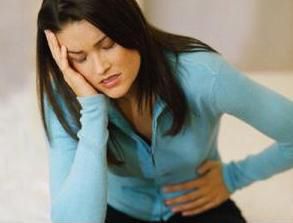Image: http://healthveda.com/menstrual-pain-causes-and-treatment-5387
Ahhhh the wonderful world of women’s hormones….most women at some point in their lives have experienced some degree of hormonal imbalance.
Now, don’t stop reading here male readers, there is much to be gained from learning a little about female hormonal disorders. A little understanding can go a long way when engaging a woman experiencing hormonal imbalances!
Hormones when working in synergy are an amazing thing. Our hormones stimulate our reproduction system, and are responsible for the formation and growth of new life through pregnancy and lactation. On a daily basis hormones are adapting to how we respond to our external environment.
It is when our hormones become ‘out of whack’ that we may run into problems. How does this happen you might ask? There are many things that can impact your hormonal balance such as stress, inflammation, thyroid disorders, nutrient deficiencies, insulin resistance, sluggish hormonal detoxification and exposure to xeno-oestrogens (synthetic/external oestrogens such as BPA in plastics).
Usually hormonal disorders are experienced when the three main female hormones – oestrogen, progesterone and to the lesser degree, testosterone, are out balance.
When oestrogen is in a state of excess you may experience hormonal disorders such as:
Heavy bleeding (menorrhagia) fibroids, endometriosis, painful periods (dysmenorrhoea) or even breast cancer.
Whilst when oestrogen is in a state of deficiency you may experience:
Menopausal symptoms such as hot flushes, night sweats, insomnia, anxiety, depression and low libido.
When progesterone is deficient you may experience hormonal disorders such as:
PMS, irregular cycles, premenstrual breast tenderness, dysmenorrhoea or infertility.
Conditions of testosterone excess may present as:
Polycystic ovarian syndrome, acne, facial hair growth, absence of periods and infertility.
So what can be done?
As I always like to tell my patients, ‘food is medicine!’. In the case of our hormonal balance, eating a nutritious, balanced diet with a focus on fresh wholefoods is a great way to support healthy hormones and our health in general.
There are a range of foods that can be included in the diet to encourage hormonal balance.
Key foods include:
Broccoli: Helps to promote hormonal detoxification, which is necessary to prevent conditions relating to oestrogen excess. Broccoli contains magnesium which may help to prevent hormonal imbalances such as insulin resistance, stress and inflammation.
Turmeric: Helps to support the clearance of oestrogens by inducing enzymes that are needed in liver detoxification. It is also great for reducing inflammation in the body, another factor that can contribute to hormonal imbalance.
Deep sea fish: High in Omega 3 fatty acids, deep sea fish such as salmon and tuna, are great in helping address hormonal imbalances, particularity when inflammation is present. Reducing inflammation in the body can help to balance our hormones and may reduce symptoms such as period pain.
Ginger: May help assist in balancing the hormones by reducing inflammation in the body and improves circulation especially to the pelvic area.
Pumpkin seeds, sunflower seeds and almonds: These lovely nuts and seeds contain trace minerals such as zinc, calcium and magnesium. Magnesium has many roles in the maintenance of hormonal balance. It is crucial in the detoxification of oestrogen and helps to reduce inflammation in the body. Calcium is important in maintaining hormonal balance, as it can help balance our oestrogen levels. Low calcium blood serum levels have been found to be present in female hormonal disorders such as PMS, poly cystic ovarian syndrome and menopause. Zinc is an important nutrient needed for the modulation of neurotransmitters such as serotonin and dopamine which regulate mood and can play a role in PMS.
A healthy diet full of fresh wholefoods and an active lifestyle can go a long way in improving many common hormonal disorders. You don’t need to suffer in silence or hormonal induced rage! If you find that your hormones are making life a little unpleasant and you’re not sure where to start, consider coming in for a Naturopathic consultation. Naturopathy aims to determine and treat the cause of imbalance through the use of herbs, supplements and positive dietary changes.
Thanks for reading, everyone.
References:
Metagenics seminar. Female Hormonal Disorders: Simple Strategies for Great Clinical Outcomes. October – November 2014.
O’Donahue, Suzie. Gynaecology. Approaches to Treatment with Natural Therapies. Melbourne 2003.
Trickey, Ruth. Women, Hormones and the Menstrual Cycle. Herbal and Medical Solutions from Adolescence to Menopause. 2003. Allen and Unwin.
Conditions of Use
If you have any questions about these conditions please contact us.
Disclaimer
All advice and information on this blog is given in good faith and is based on sources believed to be reliable and accurate at the time of release. Waverley Central Chiropractic Clinic do not accept legal liability or responsibility for the content of the advice or information or any consequences arising from its use.
The material on this blog may reflect the views or recommendations of third parties which do not necessarily reflect the views of the relevant persons, nor indicate a commitment to a particular course of action.
Health and medical information disclaimer
The information provided on this blog is provided for information purposes only. If you are a patient using this blog, you should seek assistance from a health care professional when interpreting these materials and applying them to your individual circumstances.
If you have any concerns about your health, consult your general practitioner. Information provided on this blog does not imply endorsement of third-party services or products and cannot provide you with health and medical advice.





